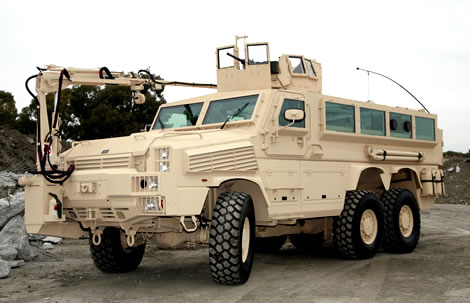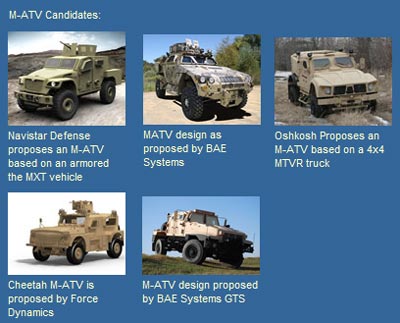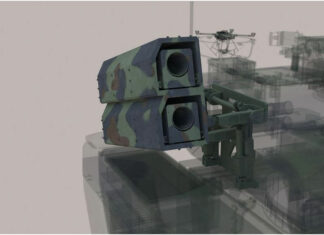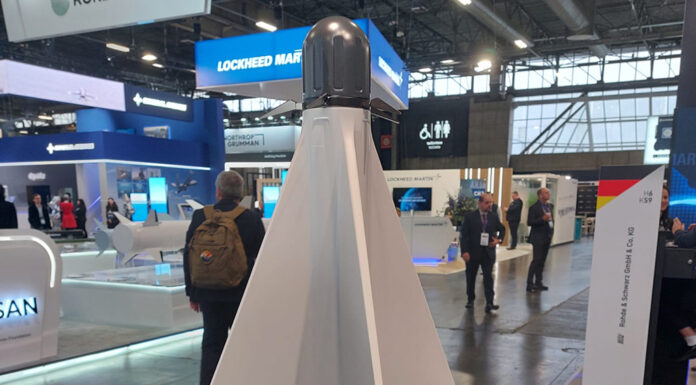The second M-ATV model developed by BAE System represents an optimized design offering higher mobility, high power/weight ratio and ample payload capacity for future growth. It shares many design features with BAE Systems/Navistar’s JLTV vehicle currently in development. One of these common design features is the hexagonal cross-section, offering both protection and comfort, having the widest space at the elbow level. With a curb weight of 18,000 pounds (9 tons), M-ATV is expected to weigh about 4,000 lbs more than JLTV. It can be loaded up to a combat weight of 26,000 pounds. Gross Vehicle Weight can increase up to 32,000 lbs if needed. The vehicle uses all-wheel independent suspension with wheel travel of 20″, offering cross-country mobility better than HMMWV while offering MRAP level protection.
The vehicle can travel 300-340 miles distance. Off-road mobility is imperative for operations in Afghanistan, where only few paved roads exist. It uses the same principle of frame-less V-shaped monocoque hull, but in contrast to the much larger 6×6 RG33, the M-ATV uses shorter wheel base offering improved cross country mobility.
Unlike MRAPs, which are extremely heavy and difficult to control, M-ATVs is equipped with advanced suspension, power steering and improved steering angle, to be driven like a ‘big sport utility vehicle (SUV)’ says Matt Riddle, Vice President and General Manager of BAE Systems’ U.S. Combat Systems. It is powered by an uprated V8 Caterpillar engine which is 50 hp more powerful than the largest MRAP engine, delivering 1,000 lb/ft torque. BAE Systems claims its M-ATV has dash and slope capability. This M-ATV can safely travel 65 mph on road (the company claims it can make 80 mph if needed, but the tires are rated to 65). The engine is coupled with an in-line starter-generator providing 20kW on-board and export power in addition to the providing for the vehicle’s own electrical consumption. The vehicle uses seven identical transparent, interchangeable armored windows providing the same protection level as the hull. The hull has already been subjected to ballistic and blast tests. Under the current program the company is building five prototypes. According to Riddle his company’s M-ATV design offers advanced technology and agility derived from advanced platforms such as the JLTV and features and has potential commonality with future JLTV model.
BAE Systems decided to submit two different proposals since both vehicles represent two different solutions to the M-ATV requirement. The vehicle combines the high protection level and multi-mission effectiveness maturity and supportability derived from current technology. According to Regis Luther, Vice President of Light Tactical vehicles, at BAE Systems’ Global Tactical Systems (GTS) line of business, the Caiman shares 90% of its automotive systems with FMTV. GTS M-ATV and FMTV also use the common armor system, power generation systems, seats, windows and fire suppression systems which greatly reduce logistics requirements army-wide.
The M-ATV based on the ‘Caiman lite’, while retaining the FMTV/Caiman design the M-ATV weighs 33% less then the Caiman Lite aiming at a Gross Vehicle Weight (GVW) of 25,000 pounds. The Caiman’s monocoque hull is attached to the FMTV welded frame, fitted with long leaf parabolic monolithic suspension for off-road high mobility. The vehicle can be fitted with larger wheels for added mobility. This M-ATV is building on the legacy of 53,000 FMTV trucks all terrain medium and light trucks supporting the Army in the field. BAE Systems already tested the chassis in Aberdeen last year and the company is geared for high volume production of this model at its production facilities in Sealy, Texas.
By the middle of March 09 BAE Systems confirmed that both of the proposals submitted to the program passed the initial evaluation. On May 1 the company announced receiving follow-on contracts for the delivery of three production ready vehicles of each type, to be evaluated for the final selection phase. Other companies awarded similar contracts are Oshkosh, Navistar and Force Dynamics.
- M-ATV Specifications and Performance
- Implementing Lessons from the MRAP
- M-ATV Candidates
- Producing the M-ATV
- BAE Unveils Two M-ATV Models
- Cheetah M-ATV Candidate
- Oshkosh Unveils MTVR-Based M-ATV
- Navistar’s proposes MXT for M-ATV




















